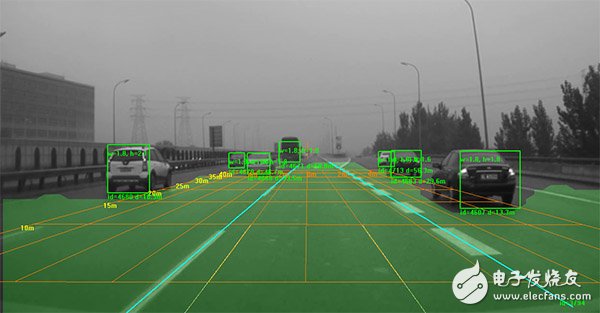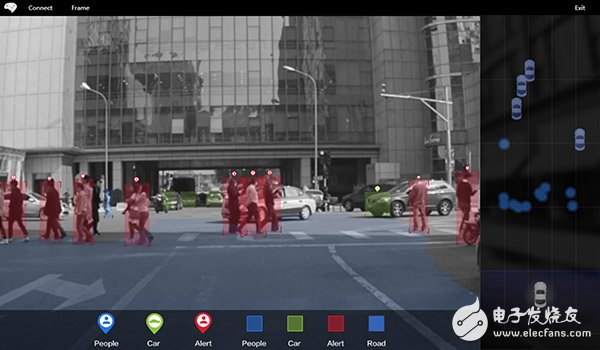At the Consumer Electronics Show (CES) in Las Vegas on January 5-8, Horizon Robot (hereafter referred to as "Horizon") will jointly demonstrate with Intel a prototype system for ADAS products based on monocular cameras and FPGAs. Vehicle test result The prototype was jointly developed by Intel and Horizon, based on the latest low-power deep neural network processor architecture IP designed by Horizon. In terms of division of labor, Intel provides an FPGA hardware platform, and the horizon provides a deep neural processor architecture for implementing FPGAs, deep neural network algorithms, and a complete set of embedded artificial intelligence solutions. The system enables ADAS functions in highway and urban road scenarios, enabling simultaneous real-time detection and identification of vehicles, lane lines, pedestrians, and drivable areas. The live demonstration will try to restore the real-time calculation process of the visual part of the driving. A monocular camera connected to the hardware platform is used to capture the road conditions, and the traffic environment is processed in the hardware platform to simulate the driving assistance function based on computer vision during driving. Limited to indoor display can not provide a real road environment, the camera will capture the driving road video broadcasted by the monitor to simulate the real situation, the camera observes the road ahead from the front glass. The result of the real-time arithmetic processing will be output by another display, and the viewer can see the result of the target detection and recognition in the picture to demonstrate the recognition rate and hardware performance of the algorithm. It is well known that in the implementation of vision-based ADAS functions, the performance of image correlation algorithms is highly correlated with computational resources. Among them, the image processing algorithm based on deep learning puts higher demands on the computing performance, power consumption, and cost control of the hardware. In order to reduce the pressure on the hardware, the optimization of the algorithm itself will become a top priority. The demonstration of this product prototype can not only prove the performance of Intel's hardware platform, but also demonstrate the power of optimization of the horizon algorithm. According to the disclosure, this is the first time in the industry to demonstrate deep learning performance on Intel's FPGA platform. It is also the first time that Horizon has demonstrated the latest developments in its processor architecture. Horizon was established in July 2015. It has Beijing headquarters and Shenzhen and Nanjing branches. The automotive business mainly provides embedded artificial intelligence solutions based on deep neural network and deep learning for autonomous driving. The main products are core processor architecture and software. The algorithm and complete technology solution is a second-level component supplier for front-loading. At present, the horizon provides a comprehensive solution based on deep learning on software algorithms, featuring high performance and low computational complexity. At the launch of this year's smart car "Singularity Car", the Horizon first demonstrated to the outside world the ADAS product prototype system that uses the monocular camera to simultaneously achieve pedestrian/vehicle/lane line detection. In March of this year, Horizon has independently developed a Hugo 1.0 platform that is designed specifically for its own deep learning algorithms. Intel recently reiterated its determination to enter the automotive field and look forward to continuing to write the glory of the PC era with the automotive business. In the past two years, the company has made a fortune in the automotive field through a series of acquisitions, and has completed the acquisition of programmable logic device manufacturer Altera, Italian semiconductor manufacturer Yogitech and computer vision company Itseez Inc. Recently, it has announced the establishment of the Automated Driving Division (ADG), a division dedicated to providing automated driving technology solutions. In the automotive field, Intel's cooperative business has been launched. At present, the company has jointly developed driverless car technology in conjunction with BMW and Mobileye, allowing BMW self-driving cars to go on road in 2021. This cooperation with the Horizon will provide a new case for Intel's research and development in the automotive field. disease virus antibody test kit /antibody test kit coronavirus Antibody Test Kit,Hiv Antibody Test Kit,Antibody Rapid Test Kit,Disease Antibody Test Kit Guangzhou HangDeng Tech Co. Ltd , https://www.hangdengtech.com

New Coronavirus antibody detection: assist clinical diagnosis, as a supplement indicators for nucleic acid detection
Test samples: serum, plasma, venous whole blood
Sample capacity: 10uL
Intended usage:
This kit is used for qualitative detection of New Coronavirus(2019-ncov) antibodies in human serum, plasma and venous whole blood samples in vitro.
It is only used as a supplementary test indicator for suspected cases with negative detection of New Coronavirus nucleic acid or used in conjunction with nucleic acid detection in the diagnosis of suspected cases. Restricted to medical institutions.